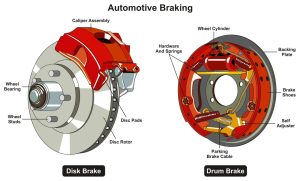 Brake pads are an essential part of your braking system, as they generate the friction that brings your wheels to a stop. The pads wear down over time, which increases the time needed for your brakes to engage. As your Nissan dealer, we want to tell you about some of the signs we need to install new pads for you.
Brake pads are an essential part of your braking system, as they generate the friction that brings your wheels to a stop. The pads wear down over time, which increases the time needed for your brakes to engage. As your Nissan dealer, we want to tell you about some of the signs we need to install new pads for you.
Screeching Noises
When you hit the brakes, your Nissan should respond almost instantly and your car will come to a stop. The pads are covered by a friction material covering that generates friction against the rotors. Each time you apply the brakes, minute particles of friction material flake off. A new pad has a 1/2″ thick covering, and a pad needs to be replaced when it reaches 1/4″ thickness.
Pad manufacturers install a warning device in each pad to remind you that they need to be replaced. When a pad’s material covering drops to 1/4″, a metal spike is revealed. This spike will scratch against the smooth surface of the rotor each time you brake, and it produces a loud screeching noise. If you hear this sound when you brake, it’s time to visit us for new pads.
Glazed Pads
A glazed pad is a pad that’s been kept in contact with a rotor for an extended period. When you hit the brakes, the brake calipers close on either side of each rotor, and the pads do their work of stopping your car. When you take your foot off the brake, the calipers are withdrawn. A pad can remain in contact with a rotor if it’s damaged and doesn’t withdraw completely.
The pad in a damaged caliper may continue to skim across the surface of its rotor. If this occurs for long enough, the affected pad will develop a smooth and shiny surface. This is known as glazing, and it’s dangerous, as a glazed pad can’t generate friction anymore. If you have a glazed pad, you could find that your car pulls to one side when you brake. We can easily replace a glazed pad to fix this problem.
Increased Stopping Distance
If your car seems to be taking longer to stop than it previously did, you could have worn pads. Worn pads produce less friction due to damage and a thinner material covering. The thinner covering also means that the calipers take slightly longer than usual to clamp onto the rotors. This time is measured in seconds, but it can be the difference between a near miss and a collision.
Our technicians can easily check the thickness of your pads, and install new ones if your present pads are damaged.
If you experience any braking problems, call us right away at Ed Martin Nissan.




